📞+86 153 7530 2641 📧 hongjing.Wang@feichuncables.com
Heavy Duty 12YHRDTC11YH Reeling Cable for Port Cranes | AS/NZS 2802 Compliant
Discover the Type 12YHRDTC11YH high tensile reeling cable designed for heavy-duty motorized cable reels in Australian ports. AS/NZS 2802 compliant with aramid reinforcement for maximum durability and performance in dynamic applications.
hongjing.Wang@Feichun
7/16/20258 min read
Introduction: Why Cable Performance Matters in Ports
Australia's bustling ports handle millions of tonnes of cargo annually, from Sydney's container terminals to Perth's bulk export facilities. As these operations become increasingly automated, the demand for reliable 12YHRDTC11YH reeling cable systems has never been greater. Modern port equipment requires cables that can withstand the punishing conditions of constant movement, extreme weather, and heavy mechanical loads.
The challenges facing cable systems in Australian ports are multifaceted. Equipment like ship-to-shore cranes, rubber-tyred gantry cranes (RTGs), and stacker reclaimers operate around the clock, subjecting cables to dynamic bending, tensile stress, and environmental extremes. These heavy-duty cable for ports applications demand solutions that go far beyond conventional power cables.
Meeting stringent Australian standards, particularly AS/NZS 2802 cable compliance, is crucial for ensuring safety, reliability, and operational continuity in port environments.
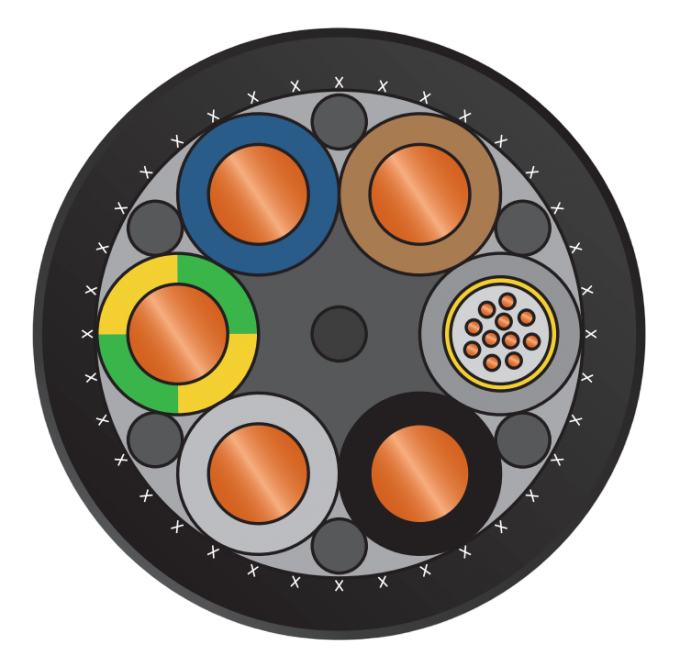

Product Overview: What Is Type 12YHRDTC11YH Reeling Cable?
The Type 12YHRDTC11YH represents a pinnacle of engineering in high tensile reeling cable technology. This specialised cable is specifically designed for heavy-duty reeling systems and motorized cable reel cable applications where conventional cables simply cannot cope with the mechanical demands.
Built to excel in dynamic, fast-accelerating equipment environments, this cable is ideally suited for ship-to-shore cranes, RTGs, and reclaimers that define modern Australian port operations. The design philosophy centres on delivering exceptional performance under tensile stress and reeling fatigue – two critical factors that determine cable longevity in port applications.
What sets this flexible rubber reeling cable apart is its ability to maintain electrical integrity whilst withstanding the mechanical punishment of continuous reeling and unreeling cycles. This makes it an indispensable component in automated port systems where downtime due to cable failure can cost thousands of dollars per hour.
Key Technical Features & Construction
The Type 12YHRDTC11YH cable incorporates advanced materials and construction techniques to deliver uncompromising performance:
Electrical Specifications:
Voltage Rating: 0.6/1 kV, suitable for most port equipment power requirements
Conductor Type: Flexible copper Class 5 for maximum flexibility and conductivity
Core Arrangement: Multicore construction with customisation options available
Insulation and Protection:
Primary Insulation: EPR (Ethylene Propylene Rubber) providing excellent electrical properties and temperature resistance
Outer Sheath: Heavy-duty PCP rubber formulated for extreme durability
Reinforcement Layer: Integrated aramid (Kevlar-type) tensile member for exceptional strength
Physical Properties:
Operating Temperature Range: -40°C to +90°C, accommodating Australia's diverse climate conditions
Minimum Bending Radius: 10 × cable outer diameter, optimising flexibility
Travel Speed Capability: Up to 180 m/min for high-speed reeling applications
Sheath Colour Options: Black or yellow for easy identification and safety compliance
The aramid tensile reinforcement is perhaps the most critical feature, providing the cable with extraordinary strength-to-weight ratio. This Kevlar-strength member allows the cable to support its own weight plus additional mechanical loads during vertical installations and long horizontal runs.
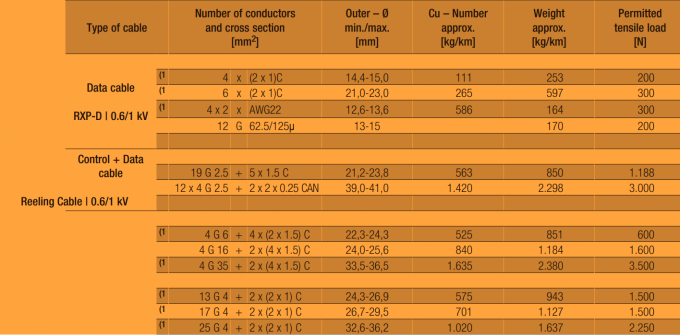

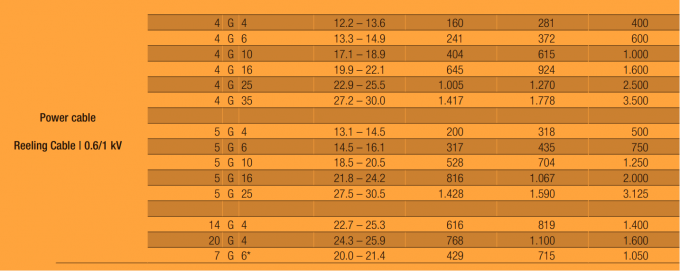

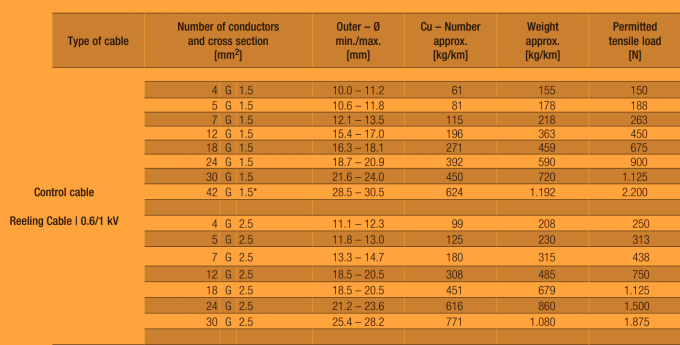


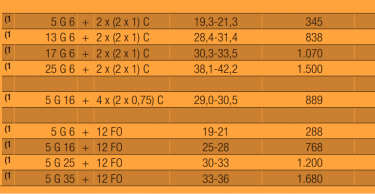
Mechanical and Environmental Durability
Australian ports present some of the world's most challenging operating environments for electrical equipment. The Type 12YHRDTC11YH cable is engineered to thrive in these conditions through several key durability features.
High Tensile Load Resistance: The integrated aramid core provides exceptional tensile strength, making it ideal for vertical drops and long horizontal pulls common in port crane applications. This high tensile strength reeling cable for stackers and reclaimers can support significant mechanical loads without compromising electrical performance.
Environmental Resistance: The heavy-duty PCP rubber sheath offers superior resistance to abrasion, UV radiation, ozone, oil, and various chemicals encountered in port environments. This comprehensive protection ensures reliable operation despite exposure to saltwater, diesel fumes, and industrial chemicals.
Exceptional Flex-Life: Continuous reeling and unreeling cycles are the norm in port operations. The cable's construction, featuring Class 5 copper conductor and optimised insulation materials, delivers outstanding flex-life performance. This translates to reduced maintenance costs and extended service intervals.
Flame Retardant Properties: Certified flame retardant per IEC standards, the cable meets stringent fire safety requirements essential for port environments where safety is paramount.
The dynamic bending radius characteristics ensure the cable maintains its integrity even under rapid acceleration and deceleration cycles typical of modern automated port equipment.
AS/NZS 2802 Compliance and Why It Matters
Compliance with AS/NZS 2802 compliant cable for motorized reels standards is not merely a regulatory requirement – it's a guarantee of performance and safety in Australian port operations. This standard specifically addresses the unique challenges faced by flexible reeling cables in mobile mining and port machinery applications.
The AS/NZS 2802 standard encompasses several critical aspects:
Mechanical Performance Requirements: The standard specifies minimum tensile strength, flexibility, and fatigue resistance parameters that cables must meet. The Type 12YHRDTC11YH exceeds these requirements, providing additional safety margins for demanding applications.
Environmental Durability: Australian conditions, from the tropical humidity of Darwin to the temperate extremes of Melbourne, demand cables that can perform consistently across diverse climatic conditions. AS/NZS 2802 compliance ensures the cable can withstand these environmental challenges.
Electrical Safety: The standard mandates specific insulation and conductor requirements that ensure safe operation in port environments where electrical safety is critical for both personnel and equipment protection.
Quality Assurance: Compliance provides assurance that the cable has undergone rigorous testing and meets the reliability standards expected in Australian industrial applications.
For port operators, choosing AS/NZS 2802 cable compliant solutions means reduced risk of equipment failure, improved safety outcomes, and compliance with insurance and regulatory requirements.
Application Scenarios in Australian Ports
The versatility of the Type 12YHRDTC11YH cable makes it suitable for numerous applications across Australian port operations:
Ship-to-Shore Cranes (STS): These towering giants require reeling cable for Australian port cranes that can handle extreme vertical loads while maintaining electrical integrity. The cable's aramid reinforcement makes it ideal for these demanding applications where cable failure can halt entire berth operations.
Rubber-Tyred Gantry Cranes (RTGs): RTGs operate in constant motion, stacking and retrieving containers with precision. The cable's exceptional flex-life and reeling fatigue resistance ensure reliable power delivery throughout these repetitive operations.
Stacker Reclaimers: In bulk commodity terminals, stacker reclaimers move vast quantities of materials. The cable's resistance to abrasion and chemicals makes it perfect for these harsh environments where dust, moisture, and chemical exposure are constant challenges.
Reeling Drum Systems: Container handling equipment relies on sophisticated reeling drum systems. The heavy-duty cable with aramid reinforcement for reeling systems provides the mechanical integrity needed for these precision applications.
Marine Loading Arms and Bulk Terminals: The cable's oil and chemical resistance, combined with its flexibility, makes it ideal for marine loading arms and bulk terminal applications where exposure to various commodities is inevitable.
Container Terminal Automation Systems: Modern reeling cable for container terminal automation systems requires cables that can support the high-speed, high-precision movements of automated equipment. The Type 12YHRDTC11YH delivers the reliability needed for these mission-critical applications.
Key Benefits Compared to Conventional Reeling Cables
The Type 12YHRDTC11YH cable offers significant advantages over conventional reeling cables:
Enhanced Tensile Strength: The aramid core provides superior tensile strength compared to conventional steel wire reinforcement, whilst being lighter and more flexible. This cable for dynamic vertical tensile applications in ports delivers exceptional performance in demanding vertical installations.
Optimised for Long-Travel Applications: The cable's construction is specifically optimised for long-travel reeling systems where conventional cables often fail due to fatigue. The combination of EPR insulation and PCP outer sheath provides the durability needed for extended travel distances.
Extended Service Life: Under dynamic load conditions, the cable demonstrates significantly longer service life compared to conventional alternatives. This translates to reduced maintenance costs and fewer unplanned shutdowns.
Customisation Options: The cable is available with customisable sheath colours and markings, allowing for easy identification and compliance with specific port safety requirements.
Superior Environmental Performance: The flame retardant rubber compound and comprehensive chemical resistance provide superior environmental performance compared to conventional cables.
Key Benefits Compared to Conventional Reeling Cables
The Type 12YHRDTC11YH cable offers significant advantages over conventional reeling cables:
Enhanced Tensile Strength: The aramid core provides superior tensile strength compared to conventional steel wire reinforcement, whilst being lighter and more flexible. This cable for dynamic vertical tensile applications in ports delivers exceptional performance in demanding vertical installations.
Optimised for Long-Travel Applications: The cable's construction is specifically optimised for long-travel reeling systems where conventional cables often fail due to fatigue. The combination of EPR insulation and PCP outer sheath provides the durability needed for extended travel distances.
Extended Service Life: Under dynamic load conditions, the cable demonstrates significantly longer service life compared to conventional alternatives. This translates to reduced maintenance costs and fewer unplanned shutdowns.
Customisation Options: The cable is available with customisable sheath colours and markings, allowing for easy identification and compliance with specific port safety requirements.
Superior Environmental Performance: The flame retardant rubber compound and comprehensive chemical resistance provide superior environmental performance compared to conventional cables.
Frequently Asked Questions About Reeling Cable Problems
Q: What causes premature failure in reeling cables? A: Common causes include inadequate tensile strength for the application, poor flex-life characteristics, insufficient environmental protection, and incorrect installation. The Type 12YHRDTC11YH addresses these issues through its aramid reinforcement, optimised construction, and robust sheath materials.
Q: How do I determine the correct cable specification for my port equipment? A: Consider factors such as travel distance, speed, environmental conditions, and mechanical loads. The cable's specifications should match or exceed your equipment's requirements, with particular attention to tensile strength and flex-life ratings.
Q: What maintenance is required for reeling cables? A: Regular visual inspections for damage, monitoring of electrical parameters, and ensuring proper reeling drum alignment are essential. The Type 12YHRDTC11YH's robust construction reduces maintenance requirements compared to conventional cables.
Q: Can the cable handle saltwater exposure in marine environments? A: Yes, the PCP rubber sheath provides excellent resistance to saltwater, UV radiation, and ozone, making it ideal for Australian port environments.
Q: What happens if the cable exceeds its minimum bending radius? A: Exceeding the minimum bending radius can cause internal damage, reduced flex-life, and potential electrical failure. The cable's 10 × diameter specification provides optimal balance between flexibility and protection.
Q: How does temperature affect cable performance? A: The cable's -40°C to +90°C operating range covers all Australian climatic conditions. EPR insulation maintains its properties across this temperature range, ensuring consistent performance.
Summary: Is This the Right Cable for Your Port Project?
The Type 12YHRDTC11YH reeling cable represents the pinnacle of engineering for Australian port applications. Its combination of high tensile strength, AS/NZS 2802 cable compliance, and exceptional environmental durability makes it the ideal choice for demanding port operations.
If your project involves heavy-duty reeling systems, motorized cable reels, or any application where cable failure could result in significant operational disruption, the Type 12YHRDTC11YH offers the reliability and performance you need. Its multicore construction, aramid tensile reinforcement, and proven track record in Australian port environments make it a top-tier solution for discerning operators.
The investment in premium flexible rubber reeling cable technology pays dividends through reduced downtime, lower maintenance costs, and enhanced operational safety. For Australian port operators seeking to maximise efficiency and reliability in their operations, the Type 12YHRDTC11YH reeling cable represents the smart choice for today's demanding port environments.
Whether you're upgrading existing equipment or planning new installations, this cable's comprehensive feature set and proven performance make it an essential component in modern Australian port operations. The combination of technical excellence and standards compliance ensures your investment will deliver reliable service for years to come.
How to Reach Us
Get in Touch
SiteMap
Product Catalogue
Reeling Cable
Festoon Cable
Shore Power Cable




Scan to add us on WeChat
